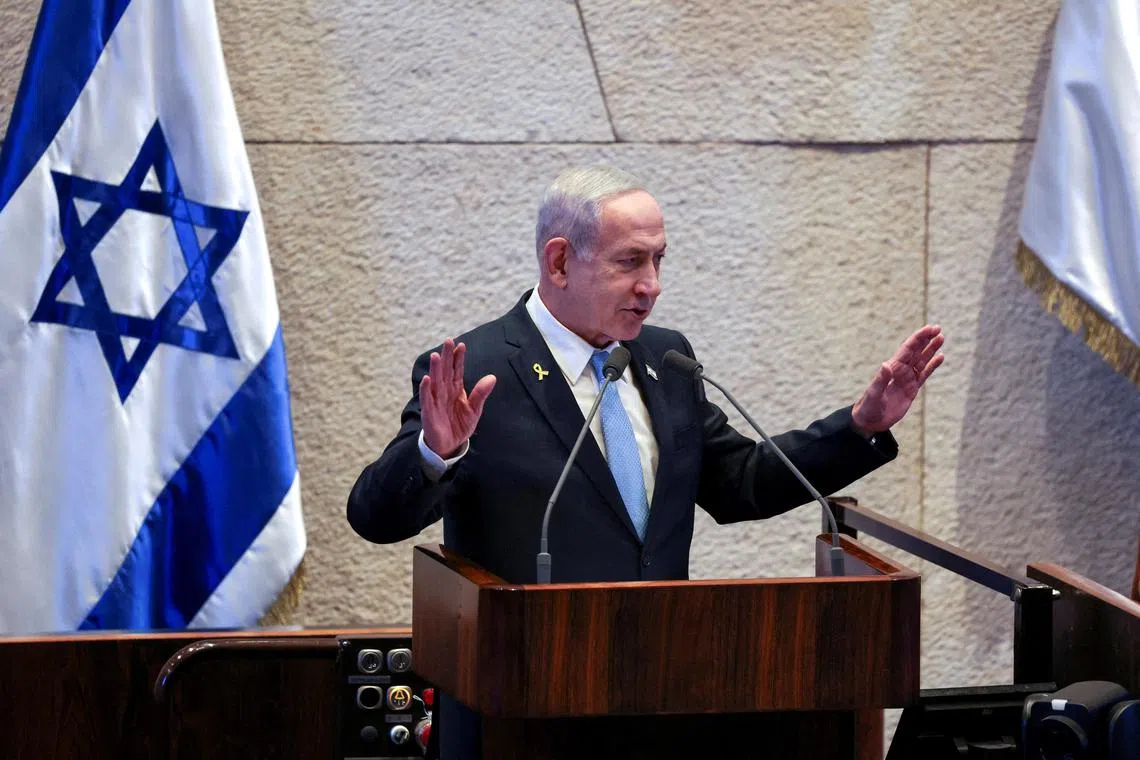Israel’s Netanyahu under mounting political pressure after party quits ruling coalition
Sign up now: Get ST's newsletters delivered to your inbox

Six members of the United Torah Judaism party handed in resignation letters overnight, leaving Israeli Prime Minister Benjamin Netanyahu with a razor-thin majority in Parliament.
PHOTO: REUTERS
Follow topic:
- UTJ party members resigned due to a dispute over military service exemptions for ultra-Orthodox seminary students.
- Netanyahu retains a slim majority, potentially enough to secure a Gaza ceasefire despite pressure from far-right coalition members.
- A conscription bill is at the centre of the crisis, complicated by Israelis' increasing weariness of the 21-month war in Gaza.
AI generated
JERUSALEM – A religious party has quit Israel’s ruling coalition in a dispute over military service, leaving Prime Minister Benjamin Netanyahu with a razor-thin majority in Parliament but still enough political support to secure a potential Gaza ceasefire.
Six members of the United Torah Judaism (UTJ) party handed in letters overnight resigning from posts in parliamentary committees and government ministries, in protest against lawmakers’ failure to guarantee future exemption from military conscription for ultra-Orthodox religious students.
Shas, a second ultra-Orthodox party closely allied with UTJ, may follow and leave the government with no Parliament majority.
The UTJ lawmakers said their walkout would come into effect after 48 hours, giving Mr Netanyahu two days to try to resolve the crisis which has dogged his coalition for months.
Even if that fails, Parliament goes on summer break at the end of July, which would give the Prime Minister a further three months to seek a solution before any loss of his majority could threaten his position.
Mr Netanyahu is also facing pressure from far-right parties in his coalition over ceasefire talks under way in Qatar.
The indirect negotiations between Israel and Palestinian militant group Hamas aim to halt fighting in Gaza for 60 days to allow half of the remaining hostages held by Hamas to be released and aid to flow into the battered enclave.
It would also open a further phase of talks on ending the war entirely.
National Security Minister Itamar Ben-Gvir and Finance Minister Bezalel Smotrich want Israel to press on with the war, but Mr Netanyahu would still be likely to have enough Cabinet votes to secure a ceasefire without them.
“As soon as the right deal is on the table, the Prime Minister will be able to pass it through,” a close aide to Mr Netanyahu, Mr Topaz Luk, told Army Radio on July 15.
Military exemptions
Israelis have become increasingly weary of the 21-month war in Gaza, which began with a surprise attack by Hamas
Israel’s subsequent offensive against Hamas has since killed over 58,000 Palestinians,
It has also exacted Israel’s highest military death toll in decades, with around 450 soldiers killed so far in Gaza combat. This has added fuel to an already explosive debate over a new conscription Bill at the centre of Mr Netanyahu’s political crisis.
Ultra-Orthodox seminary students have long been exempt from mandatory military service. Many Israelis are angered by what they see as an unfair burden carried by the mainstream who serve in the military.
Ultra-Orthodox Jewish leaders say full-time devotion to holy scripture study is sacrosanct, and fear their young men will steer away from religious life if they are drafted into the military.
In 2024, the Supreme Court ordered an end to the exemption. Parliament has been trying to work out a new conscription Bill, which has so far failed to meet UTJ demands. REUTERS

